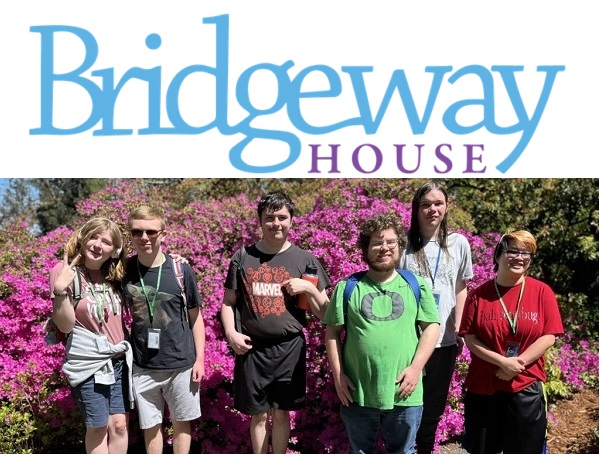Stories of Bridgeway House: Lisa Speers
4 min read
Presenter: KEPW celebrates Autistic Pride Day by visiting with the families of Bridgeway House. Lisa Speers:
Lisa Speers: Patricia Wigney and I met through EC CARES. I think it’s called something different now, but our kids are about the same age. And my son, John, is now 28, and we met through actually a grief counselor group.
[00:00:20] And I noticed her because Patricia and I (I think) found a commonality in that we were forward-thinking. And although there is tremendous grief in terms of, you’re celebrating this baby and this young toddler and this young child that you have, but at the same time you thought you were going to be on a different path and you found yourself somewhere else.
[00:00:45] And I think we were both going, ‘Okay, these are the beautiful cards that we’ve been dealt. Now what are we going to do with them?’ And so I think we got a little impatient in the grief class and started talking and I was just attracted to her energy and everything, all these things she had.
[00:01:04] And as we started talking, she said, ‘Well, you know, I’m putting together a music class in my living room, like a music therapy. Would you want John to do that?’ And I said, ‘Great.’
[00:01:13] They had a teacher who did music therapy and of course it’s, you know, 25 years ago, so I have to think through. But basically it gave each child a chance to participate, be who they want to be. There was no reprimanding for wandering off, which, you know, all the kids were doing. And if a drum was put in front of them, they wanted to play the xylophone.
[00:01:33] And if a xylophone was put in front of them, they wanted to play the flute, you know? And there was just that kind of free flow, but at the same time kind of creating boundaries and social skills to, you know, not steal the flute from your neighbor and not bonk—I don’t know if anybody was really bonking each other in the head—but, you know, they were teaching those social skills as well.
[00:01:57] You know, and he’s 28 now, so he was three, so that’s where it started. And then that ended up flowing when Bridgeway House was founded, one of the first things I signed John up for was social skills, because he was going through the public school system and I was doing my best and my husband was doing his best and his siblings were younger.
[00:02:17] So it gave us a little more structure to navigate the community and that continued all the way up into his early 20s. So it’s been quite an amazing adventure and it’s really laid some foundational principles that he’s taken into work and into the community he’s living in today.
[00:02:38] We took advantage of all of the social programs. And the nice thing about Bridgeway House is: They adapted as the children grew older. So John was on the oldest age, and so he might’ve been with 18- through 22-year-olds.
[00:02:52] And as they had the first group of 18-year-olds, they started doing 18-year-old-type social skills. You were no longer, you know, doing what you might have done with the 12- to 14-year-olds.
[00:03:04] And I think that’s really served John well, because he is living in a community now, and he understands when someone’s invading his space, or he’s moving into somebody else’s space.
[00:03:16] And he is able to navigate that with quite a bit of success. And I really have to give the credit—so much credit—to Bridgeway House for creating that year after year of, the teachers have a different skillset than regular typical teachers do. And I think those nowadays, I think, all those teachers are having to adapt.
[00:03:38] But we’re talking 25 years ago, 20 years ago, 15 years ago, and this whole community has really evolved. And Bridgeway House has been fundamental in that. The Eugene and the Lane community at large, I think they would see a serious, serious impact if Bridgeway House was not here.
[00:03:59] I’ve looked at different programs in different states and then also having two kids who grew up ‘typical’ in Eugene through the school system. And if you have a child with very specialized needs and that population seems to be only growing (Why? I don’t know), but it’s growing and you simply don’t have the services and resources in most communities, especially not in 4J in Lane County.
[00:04:29] Even though they do their best, they’re also trying to educate an entirely ‘typical’ population. And within that population you have variables. So you have variables also within the autism community. And without Bridgeway House, I think there’d just be a huge hole that would be very difficult to fill.
[00:04:53] Presenter: Bridgeway House plays an essential role in our community. To donate, visit their website at BridgewayHouse.org, or call (541) 345-0805. We’re celebrating Autistic Pride Day June 18 with ‘The Stories of Bridgeway House Radiothon’ throughout the day, right here on KEPW 97.3.
During summer break, calls to Bridgeway House will be automatically transferred to school admin team cell phones. For faster service, call the cell phones directly: (541) 743-5159 and (505) 930-6910.




